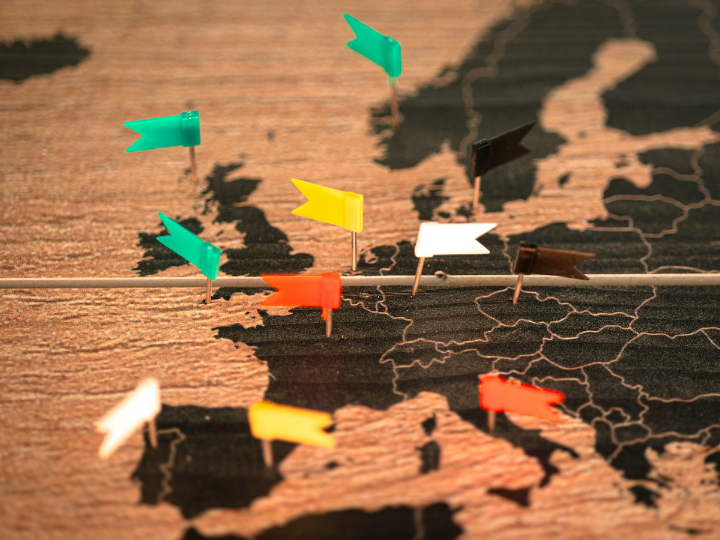by Nicholas Wallace
Forget Europe. Were Henry Kissinger still alive, he’d be asking who to call to reach Germany, Belgium or even Bulgaria.
Around half a dozen countries in the European Union presently lack functioning governments. And with Ursula von der Leyen at home in Hanover with "severe" pneumonia, not even the European Commission has a full-time leader.
Given everything else happening in Europe and the world – from Donald Trump’s pending return to power to Russia’s antics in the Baltic and the pending far-right takeover of Austria – the timing of this limbo could hardly be worse.
Decision making in the EU is fraught at the best of times. Amid a leadership vacuum, it will be virtually impossible for the simple reason that lame ducks and caretaker governments aren’t able to commit their countries to anything remotely controversial.
Don’t mention the war
With Trump already demanding Europe do more to protect itself and a crucial NATO summit, due to be held in the Hague in June, European leaders want a united front to galvanise Western support for Ukraine.
Additionally, the EU itself faces increasingly aggressive hybrid attacks, such as the cutting of undersea electricity cables serving Estonia – most likely carried out by Russia.
A new Commission also took office near the end of last year and will soon begin churning out draft legislation for member states’ approval, including a reform of the laws governing the return of irregular migrants, expected in March. A more immediate concern has already left the EU flat footed: What to do about Elon Musk?
An abundance of absent and fragile governments if it persists, could make it much harder for Europe to respond to such challenges, further eroding its standing in the world.
France’s fragmented political centre struggles to hold
Heavy hitters France and Germany are embroiled in political crises, with the political centre under intense pressure from the far-right.
In France, where coalition governments are unusual, President Emmanuel Macron has had to cobble together two fragile coalitions since last summer’s indecisive parliamentary elections. The first lasted just three months.
If the new minority coalition of liberals and conservatives cannot hold, the president may have to dissolve parliament again and call new elections later in the year.
France’s party system of centre-right versus centre-left was blown apart in 2017 by Macron himself, whose liberal La Republique en Marche, as it was then called, drew legislators and voters from both camps.
Now, the country’s fragmented political establishment is increasingly under siege from Marine Le Pen’s far-right Rassemblement National (RN), which made major gains in last year’s election.
Le Pen has been able to bring her party towards the mainstream by expelling its most extreme, Holocaust-denying elements – including her father – and focusing on heated social issues that mainstream parties were long reluctant to touch, particularly immigration and Islam.
German coalition falls apart as AfD advances
Though Germany is more accustomed to coalitions than its Gallic neighbour, it is used to them being stable. Yet the incumbent Social Democrats (SPD) and Greens are now limping towards a general election in February after the withdrawal of the liberal Free Democrats, who have played kingmaker for most German governments formed since World War Two.
As in France, the country’s political centre is under pressure from a growing far-right movement, the Alternative for Germany (AfD).
That pressure forced Angela Merkel’s centre-right Christian Democratic Union (CDU) to form a grand coalition with its old rival, the SPD, in 2018. The current CDU opposition leader, Friedrich Merz, could well face a similar choice after the election, though he may need a third partner if the SPD continues to flag.
In contrast to the French RN, the AfD started life as a relatively moderate conservative party focused on fiscal discipline and opposed to the bailouts of Greece and other countries during the eurocrisis. But in the decade since, the AfD has grown increasingly extreme and populist, and now campaigns on an anti-migrant platform similar to its French counterpart’s.
Centrist parties give way to Austria’s far-right
Meanwhile, Austria has been struggling to form a government since its general election in September. The coalition talks among the country’s centrist parties broke down on Friday after the liberal NEOS pulled out amid a stalemate over budget cuts and pension reform.
The conservative Chancellor Karl Nehammer resigned on Saturday, clearing the way for the far-right Freedom Party (FPO) to form a government for the first time in its history.
Like elsewhere, Austria’s traditional major parties – the centre-right Austrian People’s Party and the centre-left Social Democratic Party – have been squeezed by the growth of the far-right.
However, unlike the far-right parties of modern Germany and France, the FPO has been a junior partner in several coalition governments – the question now is whether it can lead.
The FPO was founded in the 1950s by a former SS general and Nazi official, Anton Reinthaller. It moderated itself for a time and then veered sharply rightwards in the late 1980s.
Bulgaria heads for eighth election in four years
Bulgaria has had seven elections in four years and may be on track for an eighth after the collapse of coalition talks over the weekend.
According to the conservative GERB party, which ended the talks, the negotiations failed because the liberal Democratic Bulgaria (PP-DB) refused to accept a cabinet led by GERB’s Rosen Zhelyazkov. Both parties are affiliated to the centre-right European People’s Party.
But much of the recent furore in Sofia surrounds another politician, Delyan Peevski, who is subject to sanctions by the United States and Britain for corruption.
Peevski has for some time stood in the way of a coalition deal between GERB and the PP-DB, though he is not a member of either. The PP-DB has insisted that GERB agree to a cordon sanitaire against him, which, until now, GERB leader Boyko Borissov has been reluctant to do.
Peevski leads the Movement for Rights and Freedoms party (DPS), which represents the country’s Turkish minority. He seized control of DPS from its former leader, who went on to found a new party.
Under Peevski’s leadership, DPS was recently expelled from the EU’s family of liberal parties, ALDE.
Belgium is complicated
Not all headless states are necessarily in crisis. In some countries, particularly Belgium, it’s normal for elections to fail to produce obvious governments.
Coalition talks have been ongoing since the 9 June election. While predicting the outcome of those talks is a fool’s game, the most likely outcome is an "Arizona" coalition – named for the colours of the American state’s flag – consisting of five parties: three Flemish and two Francophone, including liberals and conservatives, as well as one centre-left social democratic party.
Belgium has a major far-right party too, Vlaams Belang. But the far right is not the reason why Belgium is one of Europe’s headless states. Belgian federalism is so complicated and its parties so fragmented that building national coalitions would be difficult even if the far-right weren’t there.
Even Ireland is becoming interesting
Ireland has a relatively clear path to a stable coalition government following the 29 November general election last year. The new government will resemble the last one, albeit with a different third partner – probably a group of independents – and is likely to take shape in the next few weeks.
Politics on the emerald isle remain reassuringly boring, its fractious north notwithstanding.
Yet even in Ireland, a strange political shift has occurred in the last decade. Until recently, Ireland has elected governments led by either one of two main centre-right parties, Fine Gael or Fianna Fail, with the other leading the opposition.
But since 2016, they have been working together: first with a confidence-and-supply deal that saw Fianna Fail prop up a Fine Gael minority government, and then in a formal coalition during 2020-2024.
Meanwhile, the left-wing nationalist Sinn Fein – once a pariah due to its links to the now-defunct Irish Republican Army, a terrorist group – has grown to become the second-largest party in the national parliament or Dail, behind Fianna Fail and ahead of Fine Gael.
Unlike most European countries, Ireland has no organised far-right movement worth mentioning. That said, some independent politicians have won seats in the Dail by campaigning on voters’ anger about immigration and pressure on the housing market.
Chaos in Romania’s presidential race
A final nearly-headless country to note is Romania. Though Romania quickly formed a minority government after parliamentary elections in December, the two-round presidential election descended into chaos.
The country’s constitutional court cancelled the election after the first round amid concerns that pro-Russian candidate Calin Georgescu, who came first, had broken election rules and compromised the fairness of the contest. The whole process will now be re-run, starting with a review of the validity of everyone’s candidacy – including Georgescu’s.
*first published in: Euractiv.com




 By: N. Peter Kramer
By: N. Peter Kramer

